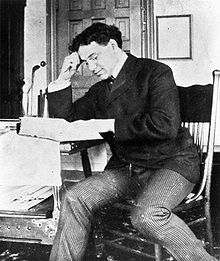Maui Pomare
Sir Maui Wiremu Pita Naera Pomare , KBE , CMG (* 1875 or 1876 in Urenui , † June 27, 1930 in Los Angeles , USA ) was a New Zealand doctor and politician. He was one of the more important Māori politicians and is particularly significant for his efforts to improve the health and living conditions of the Māori.
Childhood, youth and education
The exact date of birth of Pomare is unclear. School records give August 24, 1875, other sources January 13, 1876. He was born in a Pā near Urenui in the Taranaki region. His father Wiremu Naera Pomare came from the Iwi Ngāti Mutunga , his mother Mere Hautonga Nicoll came from the Ngāti Toa . His grandmother, Kahe Te Rau-o-te-rangi, was among the signatories of the Waitangi Treaty . Both parents died before he was adults, after which his aunt took care of him.
Pomare attended Christchurch Boys' High School , then Te Aute College . Although his family wanted him to study law, he took up medicine at a Seventh-day Adventist medical school in Battle Creek, USA , in 1895 . He stayed in the US until 1900 and traveled extensively.
Department of Health
When Pomare returned to New Zealand, public health was a concern. The quality of the apartments and the sanitary facilities was a political issue. The problem was particularly evident in the Māori communities. Pomare was one of a handful of doctors of Mori descent selected to serve as Māori Health Officer in the Department of Health . As such, he successfully ran a number of important campaigns to improve the health of the Māori. Pomare often traveled to remote villages and spoke to residents about health issues. In doing so, he acquired considerable speaking skills.
Unlike some of his friends, particularly Apirana Ngata , Pomare was not particularly concerned about the loss of Māori cultural identity. He supported the Tohunga Suppression Act 1907 , which resulted in the loss of many oral traditions. While Pomare and Ngata agreed that the Māori living conditions must be modernized, Pomare did not share Ngata's desire to preserve traditional Māori culture and art. Pomare believed that Pākehā and Māori would ultimately unite into a common culture that combines the best of both (this is a traditional ideal of his iwi).
Pomare represented the constituency Western Māori (which included the Māori of the Taranaki and Waikato regions ) in the New Zealand Parliament from 1911 to 1914 as an independent MP, then until 1930 for the Reform Party .
Supported by the Māori king Mahuta Tawhiao , he succeeded in the 1911 elections to beat the previous incumbent Henare Kaihau . He was close to the new Reform Party , which held the majority of the parliamentary seats. When the party formed the government, Pomare was appointed to the New Zealand cabinet as minister with no portfolio . This was a largely symbolic position.
Pomare was quite popular in his party, probably in part because he did not represent an independent Māori cultural identity and so fitted so well with the more conservative views of the Reform Party. Pomare's old friend Apirana Ngata was a member of the opposition Liberal Party .
In World War I, both joined the army to encourage other Māori to do the same. Both promised themselves in a broad participation in the war and in the struggle to defend the country the recognition of the Māori as full citizens by the New Zealanders of European descent. However, Pomare angered many of his followers as he eventually advocated conscription for Maori.
Minister of Health
In 1916 Pomare was appointed Minister for the Cook Islands , then part of New Zealand. He worked hard for additional funding for the islands and brought about significant improvements in the infrastructure. However, he was against the idea of self-government of the islands, as he did not consider himself ripe for it. Several times he overturned the laws of the islanders and caused displeasure. Overall, however, he was respected in the Cook Islands and received a silver mug at the end of his service.
Pomare was appointed Minister of Health on June 7, 1923 . Because of the general economic crisis, the budget of the Ministry of Health was small. This made it difficult for Pomare to initiate necessary reforms. Still, he succeeded in some areas (particularly obstetrics and the sterilization of medical instruments).
On January 18, 1926, he was replaced by James Young as Minister.
Next life
In 1928 Pomare was diagnosed with tuberculosis . In the 1928 elections, Apirana Ngata supported the Pomare election campaign, although he himself belonged to the opposition. Pomare was re-elected. Pomare later traveled to California , hoping the climate would be good for his health. He died on June 27, 1930 in Los Angeles.
Honors
Pomare was named Companion of the Order of St. Michael and St. George in 1920 and Knight Commander of the Order of the British Empire in 1922 .
Web links
- Taranaki Stories - Science And Medicine - Sir Maui Pomare's Life-long Quest . Puke Ariki, archived from the original onOctober 22, 2008; accessed on August 28, 2014(English, original website no longer available).
Individual evidence
- ↑ Rongoa - medicinal use of plants . Te Ara - the Encyclopedia of New Zealand , accessed August 26, 2014 .
- ^ London Gazette (Supplement). No. 31712, HMSO, London, December 30, 1919, p. 4 ( PDF , English).
| personal data | |
|---|---|
| SURNAME | Pomare, Maui |
| ALTERNATIVE NAMES | Pomare, Maui Wiremu Pita Naera (full name) |
| BRIEF DESCRIPTION | New Zealand doctor and politician |
| DATE OF BIRTH | 1875 or 1876 |
| PLACE OF BIRTH | Urenui |
| DATE OF DEATH | June 27, 1930 |
| Place of death | Los Angeles , USA |
